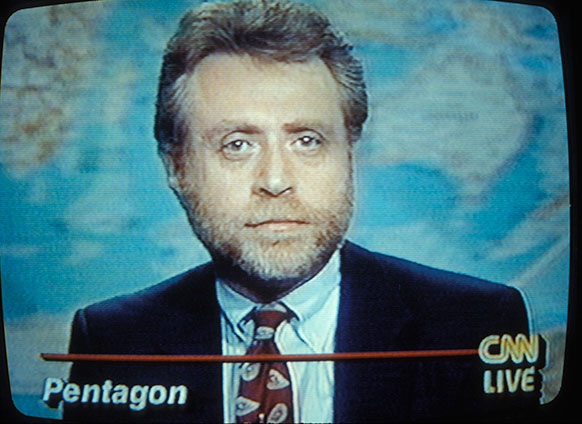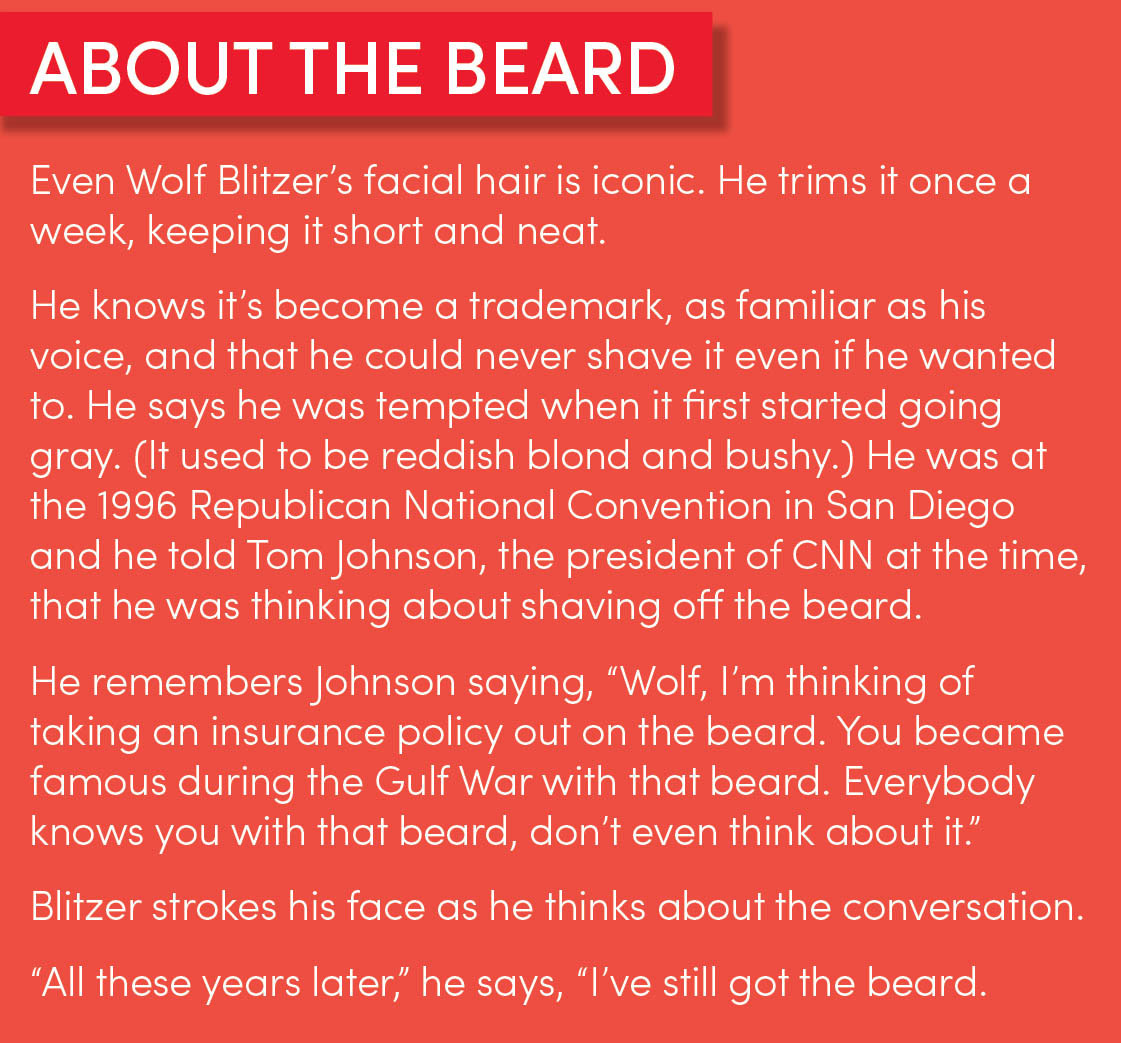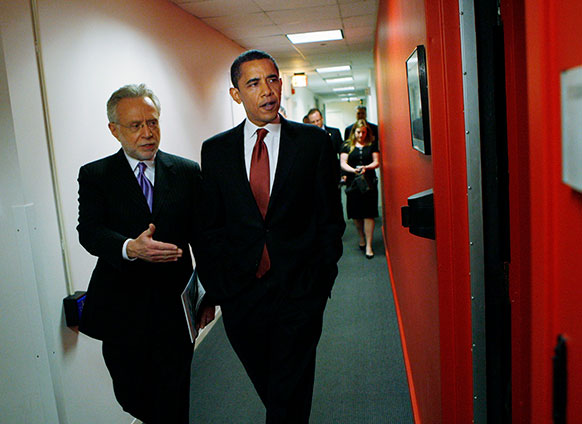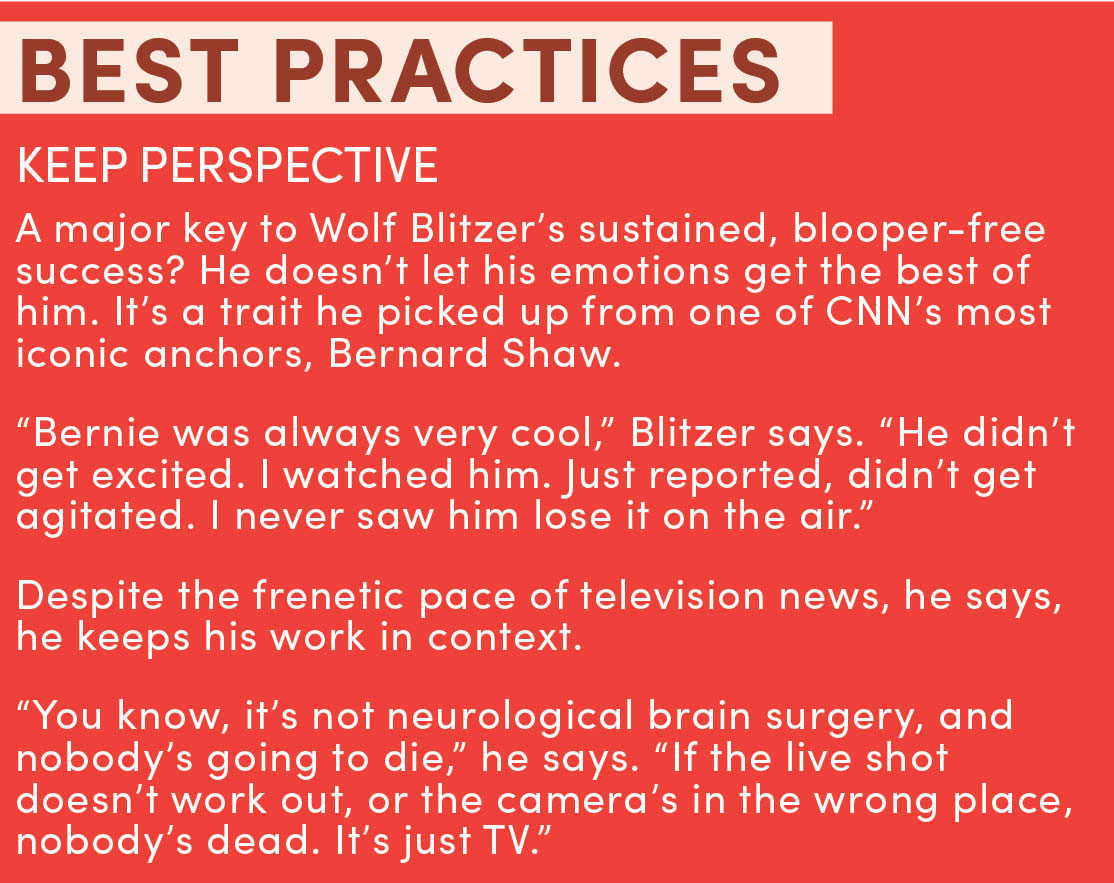Wolf Blitzer doesn’t want you to think about him. He doesn’t want you to think about what he’s thinking. He wants you to focus only on the information he’s delivering, and never on the man delivering it. He’d prefer to be unnoticed, unconsidered: a bearded, bespectacled source of trustworthy news and nothing more. It’s a skill, something he’s worked to perfect over three decades of broadcast journalism. He’s the longest-serving anchor at CNN, which you probably didn’t know because you probably never think about Wolf Blitzer. Exactly what he’s going for.
Related: Do These 6 Things to Be More Humble
He knows that he’s someone the world turns to in historic moments, that it will be his voice in future documentaries uttering things like “CNN projects Donald J. Trump will become the 45th President of the United States.” In an age of endless commentary, in a society full of people asking for more attention, Blitzer remains devoted to the idea of absolute objectivity. He doesn’t want you to know if he’s a Democrat or a Republican. (He doesn’t vote.) He only wants you to know that he will report all sides of any story. Even his voice seems perfectly balanced: a little husky, a little nasal, not too high, not too low, not too fast, not too slow—always calm and collected. And that’s not something he does for the cameras. He sounds the exact same whether he’s talking about morning traffic or the nuclear capabilities of North Korea.
This is what’s made him an American institution. He’s a fixture in millions of homes and offices, utterly undiscussed but immediately recognizable around the world. He’s often invited to appear in movies and TV shows. He always plays himself, delivering the daily news—specifically cast to make a work of fiction feel more realistic and advance a storyline while not distracting viewers.

JOHN NOWAK/CNN ©2112 CABLE NEWS NETWORK. A TIME WARNER COMPANY. ALL RIGHTS RESERVED
He’s been in the public eye for nearly 30 years and he’s completely avoided any kind of controversy or scandal. Although he’s sometimes live on the air for more than 12 straight hours, he doesn’t have any particularly memorable bloopers. (The most embarrassing moment of his career might be the time he was walloped by comedian Andy Richter on an episode of celebrity Jeopardy!) His most famous tweet was a photo of a turtle on a rock, with the commentary: “Always nice to see a turtle.” Wolf Blitzer is so straight-laced and normal that, when you think about it, he actually seems quirky. There must be something hidden, another side.
He’d prefer to be unnoticed, unconsidered: a bearded, bespectacled source of trustworthy news and nothing more.
A few months ago, I was allowed into the CNN studios in Washington, D.C., to spend a day with Blitzer. I wanted to ask him what it’s like to be someone everyone knows but nobody thinks about. I wanted to know how he’d cultivated this image, how he’s managed to avoid all manner of public trouble, despite the ubiquity of cameras and antagonists. I wanted to know how he’s maintained his image for so long, reaching a status many others have, but keeping it far longer than most are able. And I wanted to see for myself what he’s like when the cameras aren’t rolling.
Related: 11 Expert Ways to Build an Impeccable Reputation
At one point, sitting with him in his office, under a signed Skyfall movie poster and a few framed Doonesbury comic strips that reference him, I mention that New York magazine once called him “resolutely humorless.”
He shakes his head.
“I have a pretty good sense of humor,” he says. “I’m a funny guy, but that doesn’t come across on television.” He says he’s been trying it a little more on the air recently. After political reporter Nia-Malika Henderson made a Wonder Woman reference during a segment not long ago, Blitzer went to the commercial break with the straight-faced-sign off: “Nia-Malika Henderson, expert on Wonder Woman.” Those moments are rare, though. He tells me that the seriousness of breaking news, especially on the topics of politics and national defense, rarely lends itself to humor.
Still, he says, he has a joke for me.
“Did you know that in the Bible, they talk about baseball?” he asks. He’s employing the same intonation he’d use asking a U.S. senator about a forthcoming bill. Dry, cool. “Did you know that? In fact, in the Book of Genesis, the first words in the Bible.”
I look at him, befuddled.
“The first words in the Bible,” he says again. “In the book of Genesis.”
“Baseball?” I say.
“The first words in the Bible, in the book of Genesis, are… ” he pauses for effect and grins ever so slightly before delivering the punch line: ‘In the Big Inning.’ ”
Related: The Key to Accomplishing More: Having Fun
***
A little after 10 a.m., he’s walking out of the makeup room with a subtle smirk, like he’s just thought about something pleasant. No way of knowing what that might be, of course. He’s 69, but since his hair and beard started to go gray in the mid-1990s, he’s looked pretty much the same. His surroundings, though, have changed significantly. Today the Washington, D.C., bureau of CNN is at least as focused on the internet as it is on the live broadcast. A giant flat screen at one end of the office shows how many people are reading which CNN.com articles at this very second. It’s an open newsroom, buzzing with researchers, producers and reporters, decorated with CNN promotional material. One poster for The Situation Room with Wolf Blitzer features the eponymous host standing in a dark suit against a completely white backdrop, under the words WHERE IT ALL COMES TOGETHER.
By 10:45 he’s at the head of a long conference table, looking at the two dozen or so show staffers who, along with camera operators and a sound team and a tech crew and guests from all over the world, create two hours of live cable news five evenings a week. The day of my visit just happens to be right after the president had sent out an ambiguous late-night tweet that ended with “covfefe.” The staff debates how much coverage the now-deleted tweet will get on the show that day, and there are jokes about what it might mean. But Blitzer doesn’t weigh in, and in the end, the tweet will receive very little mention on The Situation Room.

EDWARD M. PIO RODA/CNN © 2008 CABLE NEWS NETWORK. A TIME WARNER COMPANY. ALL RIGHTS RESERVED.
The meeting is mostly run by the show’s executive producer, Jay Shaylor, a charismatic, dapper veteran of Good Morning America. The staffers go around the table, planning potential ideas for all segments in both hours, tracking the stories of the day and prospective guests on a tall dry-erase board. Shaylor makes it clear that, like always, depending on what’s happening in the world, this could all get scrapped in the last five minutes before air-time.
At one point, a junior staffer mentions a potential story out of Libya. There’s some brief confusion about the country’s ruling party when Blitzer, who’s mostly been quiet until now, weighs in. He recounts, from memory, the succession order of Libya’s rulers and royal family going back to the early 1970s. A few minutes later, when he hears the date, he remembers that today is also an important deadline for the president to make a decision related to the Israeli government’s desire to move its capital to Jerusalem. A room full of smart, ambitious people with degrees from the most prestigious universities in the country, and nobody seems surprised by Blitzer’s ability to recall a catalog of arcane international knowledge. Apparently it happens all of the time.
Some TV personalities are notoriously unlovable off the air. Some famous cable news hosts have been caught mocking public figures or screaming at producers in stressful moments. But the people around Blitzer describe a man who never seems rattled, even in the chaotic frenzy of an election night, when people are running in every direction around him. They talk about how he’s been married to the same woman for more than 40 years, and how, despite his fame, he always shows up if he’s invited to a birthday party or a dinner. Dozens of people have photos they can point to and say something along the lines of That’s my cousin, that’s my aunt, that’s another cousin, and that’s Wolf Blitzer. He even has a name for the people on his team: The Wolf Pack. He tells them, “Once you’re a member of the Wolf Pack, you’re always a member of the Wolf Pack.”
Related: 7 Ways to Be Likeable
Sam Feist, the D.C. bureau chief and senior vice president of the network, has worked with Blitzer for more than 20 years. “If you just picked a random person in this building, they would all say the same things about Wolf Blitzer,” he tells me. “Nicest guy, smart, steady, calm, solid.”
Dana Bash, CNN’s chief political correspondent, has also worked with Blitzer for more than 20 years. They met when she was an associate producer, running the teleprompter for a weekend show he was hosting. She talks about how difficult it is to read something on camera, with a producer squawking in your ear, and still seem comfortable and natural. “It’s a very different kind of skill,” she says. Blitzer doesn’t make stupid mistakes, she says, because “he’s the ultimate professional—truthfully, I don’t think he thinks of anything stupid.” In the studio, he reminds visitors with a polite earnestness not to walk in front of the cameras.
Bash has plenty of stories about Blitzer acting goofy off-camera, though. Stories of him singing the lyrics to that old Chumbawamba song, or doing the Macarena or the Dougie. “He’s somebody who likes to think that he’s super in-the-know on pop culture,” she says. “I’ve never seen him dab, but I wouldn’t be surprised.”
***
The most common question he gets when strangers meet him, usually in airports or at sporting events, is whether his name is real. It is. (His mother’s father had the same first name.) Blitzer was born in Germany, the son of two Polish refugees from Auschwitz who met on a train Holocaust survivors took when they went looking for lost relatives. His family moved to Buffalo, New York, after his father stumbled upon a line for American visas. His parents spoke no English when they arrived, but the local community took them in.
His father worked first for a steel company, then at a deli with his brother-in-law, until he started his own company building houses in the suburbs all over western New York. Blitzer says his father was always grateful for the life this country provided. “He became the greatest patriot that America ever had, because America gave him that opportunity.”
Related: What Being an Immigrant Taught Me About Success

© GENE BAKER/ZUMA PRESS
Blitzer studied history and international relations in college, intrigued by the possibility of becoming a foreign correspondent somewhere. “You put on a trench coat; you travel all over the world,” he says. He started as a print reporter for Reuters, then for the Jerusalem Post, before being hired as the Pentagon correspondent by CNN in 1990. He figured, because the Cold War was winding down by then, the job would probably be relatively quiet. But a few weeks later, Saddam Hussein surprised the world by invading Kuwait, and the U.S. dispatched more than half a million troops to the Persian Gulf. Blitzer was sent to the Middle East, one of the lead reporters for the only 24-hour news network at the time. This was the first time Americans got to see a war broadcast live, replete with night-vision footage of the Iraqi skyline lit up with bombs.
Johnny Carson started making jokes about his name on the Tonight Show. He remembers Carson saying, “Kevin Costner’s going to make a sequel to his movie, and it’s going to be called Dances with Wolf Blitzer.” But the newsman didn’t realize exactly how well-known he’d become during the war until he came back and the supermarket cashier recognized him at checkout. That’s the instant he knew life would be different.
“All of a sudden I was looking at my cart,” he says. “Looking at what I put out there on the counter, saying, ‘I wonder if there’s anything embarrassing.’ You know, Preparation H or something.”

Around the Pentagon, he had a reputation as a solid, fair reporter, interested in scoops but much more interested in accuracy. In the mid-1990s, he was reassigned to the White House, covering the ups and downs of the Clinton administration. Then he started anchoring weekends. Then he earned his own show and slowly became the institution he is today. It’s strange to think about, but in a society that treats news as entertainment, he’s quietly, with hard work and discipline, become one of the most recognizable faces on television. He’s basically America’s most well-informed grandpa character.
***
As his team is working on the lineup for the 5 p.m. start of today’s show—monitoring stories, booking then unbooking then rebooking guests, writing whatever scripted parts they can, triple-checking whatever facts they can—Blitzer is in the studio broadcasting Wolf, his live early afternoon breaking news show. When that’s over, he invites me into his office to sit down and ask him anything I want. He does so with perfect politeness. Not too reticent, not too eager. The same person he is on TV.
I ask him if he ever gets flustered.
“If the Washington Wizards lose a game that they shouldn’t have, I lose it sometimes,” he says. “I get a little upset.”
“When was the last time you actually got angry?” I ask. “Not sports-related.”
“I wouldn’t necessarily say angry,” he says. “Disappointed. If a friend disappoints me in something, I will be upset about it, and I’ll have a personal conversation. Some friends of mine occasionally do some weird things and I have conversations with them.”
Related: 10 Ways Successful People Stay Calm
The weirdest thing he does, as far as I can tell, is refuse to take an elevator before a show—always opting for the stairs instead, no matter the number of floors he needs to traverse. He doesn’t want to risk getting stuck and missing his show. And no, that’s never happened, but he doesn’t want to take a chance.

AP PHOTO/CHARLES DHARAPAK
How does he think he’s been able to go so long without any scandals or controversies?
“If you work, hard, as my dad always used to say,” Blitzer tells me, “and play by the rules, do the right thing, hopefully things will work out.”
He says that he learned his craft from the British journalists at Reuters. They stressed to him over and over that the journalist shouldn’t be a part of the story: “Just report the news.” And then he learned about TV news from legends like Bernard Shaw at CNN, who told him the same thing.
He tells me that he never gets upset at work because he’s just so grateful to be doing what he does. He’s not passionate about much—another reason he’s able to avoid scandal—but he really cares about the privilege of delivering the news. (He says he only sees one side to freedom of the press issues.)

While we’re talking, it occurs to me that the most interesting thing about Wolf Blitzer might be how famous he’s become by actively not seeking attention for himself. By not getting worked up over anything he shouldn’t. And what that says about the world we live in now.
Soon he has to get going. He has a rundown meeting to attend before the show. Before he goes though, he tells me one more thing. He says it sort of sums up his entire attitude about this job, and the fame, and the way he sees the world. He wants to tell me how he feels about something, what he’s thinking.
I lean closer.
“I feel so blessed that I can make a living doing something I love doing,” he says. “If you can combine your passion with your livelihood, you’ll do your job much better; you’ll enjoy life much more.”
Related: How to Make Your Passion Your Profession
This article originally appeared in the October 2017 issue of SUCCESS magazine.




